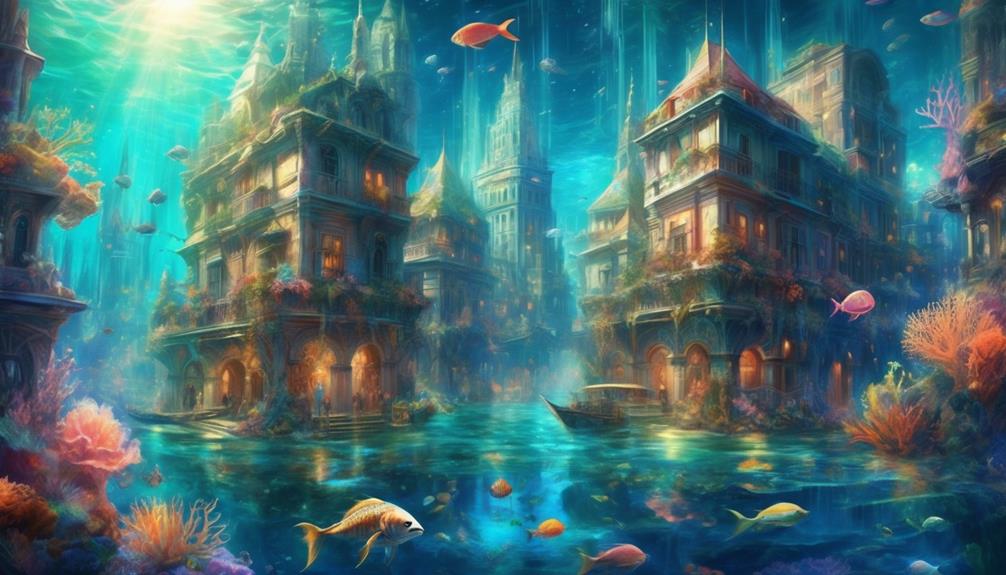The legend of the lost city of Atlantis has captivated the imaginations of people for centuries, sparking countless theories and expeditions in search of its supposed underwater ruins.
This enduring fascination with mythical underwater kingdoms raises the question of why these tales continue to hold such appeal. From ancient folklore to modern literature, the allure of submerged realms seems to transcend time and cultural boundaries.
But what is it about these hidden underwater worlds that continues to captivate the human mind?
Key Takeaways
- Underwater kingdoms have origins in ancient folklore and mythology, playing a role in shaping beliefs and traditions.
- They are depicted as realms of powerful sea gods and mythical creatures, reflecting human fascination with the mysteries of the ocean.
- Underwater kingdoms in Greek and Norse mythology are associated with both beauty and danger, reflecting awe and cautionary tales.
- In Asian folklore, underwater kingdoms hold significant importance, portrayed in artistic representations and adding depth to legends.
Origins of Underwater Kingdoms
The origins of underwater kingdoms can be traced back to ancient folklore and mythology. They were often depicted as the realms of powerful sea gods and mythical creatures. These ancient legends held great cultural significance for many societies. They served as a way to explain natural phenomena and instill a sense of awe and wonder about the unknown depths of the sea.
The idea of underwater kingdoms also reflected the human fascination with the mysteries of the ocean. It represented the desire to explore and understand the uncharted territories. Across different cultures, these myths and legends played a pivotal role in shaping beliefs, traditions, and even maritime practices.
These captivating tales showcase the enduring impact of underwater kingdoms on human imagination and cultural heritage.
Underwater Kingdoms in Greek Mythology
Immerse yourself in the depths of Greek mythology and discover the enigmatic underwater kingdoms that were believed to be ruled by powerful deities and creatures of the sea.
In Greek mythology, the underwater realm was governed by Poseidon, the mighty god of the sea, earthquakes, and horses. The most famous underwater city in Greek mythology was Atlantis, which was said to be an advanced civilization that ultimately sank into the depths of the ocean.
Mythical creatures such as the fearsome sea monster Scylla and the seductive sirens were also associated with the underwater kingdoms, adding to the allure and mystery of these ancient tales.
These myths not only reflected the Greeks' awe and respect for the untamed forces of the sea but also served as cautionary tales about the perils of hubris and the consequences of defying the natural order.
Underwater Kingdoms in Norse Mythology
In Norse mythology, the depths of the sea harbored mythical underwater kingdoms ruled by powerful deities and populated by mysterious creatures, drawing parallels to the enigmatic underwater realms of Greek mythology.
According to Norse legends, the underwater kingdom is ruled by the sea god Aegir and his wife Ran, who are accompanied by their daughters, the sea maidens known as the Nine Daughters of Aegir.
These underwater realms are also inhabited by various creatures such as the fearsome sea serpent Jormungandr, the giant wolf Fenrir, and the devious shape-shifting sea witch known as the Kraken.
Norse mythology depicts the underwater kingdom as a place of both beauty and danger, captivating the imagination with its majestic deities and formidable underwater creatures.
Underwater Kingdoms in Asian Folklore
Beneath the rippling surface of Asian folklore, lies a realm of mythical underwater kingdoms teeming with majestic creatures and enigmatic deities.
In Asian cultures, underwater kingdoms hold significant importance and are deeply embedded in legends and folklore. These kingdoms are often portrayed in artistic representations, showcasing the cultural significance they hold.
Asian folklore is rich with tales of mythical creatures such as the dragon turtle in Chinese mythology, the ningyo in Japanese folklore, and the makara in Hindu mythology. These creatures are revered and feared, adding layers of depth to the legends surrounding underwater kingdoms.
The artistic representations of these mythical creatures further solidify their place in the cultural heritage of Asian societies, making underwater kingdoms a captivating and enduring aspect of Asian folklore.
Underwater Kingdoms in Modern Literature
Modern literature has continued to draw inspiration from the rich tapestry of mythical underwater kingdoms found in Asian folklore, infusing new depths into the portrayal of these legendary realms. These modern adaptations often use underwater kingdoms as a metaphor for the subconscious mind or as a symbol of hidden truths and mysteries.
Authors have skillfully woven literary symbolism into their narratives, using underwater kingdoms to explore complex human emotions, desires, and fears. For example, in contemporary novels such as 'The Deep' by Rivers Solomon, the underwater kingdom serves as a powerful allegory for historical trauma and resilience.
This trend showcases how mythical underwater kingdoms have evolved beyond traditional folklore, becoming a compelling literary device that resonates with the complexities of the modern human experience.
Symbolism of Underwater Kingdoms
Diving into the depths of symbolism, mythical underwater kingdoms serve as captivating allegorical representations in literature, delving into the intricacies of human emotions and subconscious themes.
The cultural significance of underwater kingdoms lies in their portrayal of the unknown and the mysteries that lie beneath the surface of the water, reflecting humanity's fascination with the unexplored.
Artists have long utilized underwater kingdoms as a means of artistic representation, using them to symbolize hidden desires, fears, and the complexities of the human psyche.
From a psychological interpretation, these mythical kingdoms often feature a rich array of mythical creatures, each representing different aspects of human nature. The mermaid, for example, may embody the allure and danger of temptation, while sea monsters could symbolize the depths of human fears and the challenges of overcoming them.
Fascination With Underwater Kingdoms
The allure and complexity of mythical underwater kingdoms have captivated human imagination for centuries, fostering a deep fascination with the mysteries of the deep. The exploration of underwater realms in mythology and folklore often taps into the human psyche, invoking a sense of wonder and curiosity.
These fantastical realms offer an escape from the constraints of reality, allowing individuals to explore their imagination and delve into the unknown. The psychological appeal of underwater kingdoms lies in their ability to symbolize hidden desires, fears, and the vastness of the human subconscious. They serve as a canvas for the human mind to project its deepest longings and anxieties.
The fascination with these mythical realms reflects humanity's innate yearning for exploration and the enigmatic forces that lie beyond our current understanding.
Frequently Asked Questions
How Do Underwater Kingdoms Compare to Real-Life Underwater Civilizations, Such as the Lost City of Atlantis?
Underwater kingdoms, like the lost city of Atlantis, are often compared to real-life underwater civilizations due to their historical significance. The comparison highlights the allure of mythical realms and the fascination with lost civilizations.
Are There Any Scientific Theories or Evidence Supporting the Existence of Underwater Kingdoms?
Scientific exploration of the deep sea has revealed fascinating historical myths and mysteries, but there is currently no scientific evidence supporting the existence of mythical underwater kingdoms. These captivating tales continue to intrigue.
Do Underwater Kingdoms Have Any Connection to the Concept of the Subconscious Mind or the Depths of the Human Psyche?
Subconscious symbolism and psychological exploration may be connected to mythical underwater kingdoms due to their cultural significance. These legends offer a glimpse into the human psyche, reflecting our fascination with the unknown and the depths of our imagination.
What Role Do Underwater Kingdoms Play in Contemporary Pop Culture, Such as in Movies, Video Games, and Art?
Underwater kingdoms hold a significant role in contemporary pop culture, appearing in movies, video games, and literature. Their representation in these media forms often reflects themes of mystery, adventure, and the allure of the unknown.
Are There Any Modern-Day Communities or Cultures That Still Believe in the Existence of Underwater Kingdoms, and How Do They Incorporate These Beliefs Into Their Traditions and Practices?
Indigenous communities across the globe maintain beliefs in underwater kingdoms, incorporating them into cultural traditions and rituals. These beliefs are rooted in folklore and are integrated into everyday life, showcasing the enduring impact of mythical underwater realms on modern cultures.

